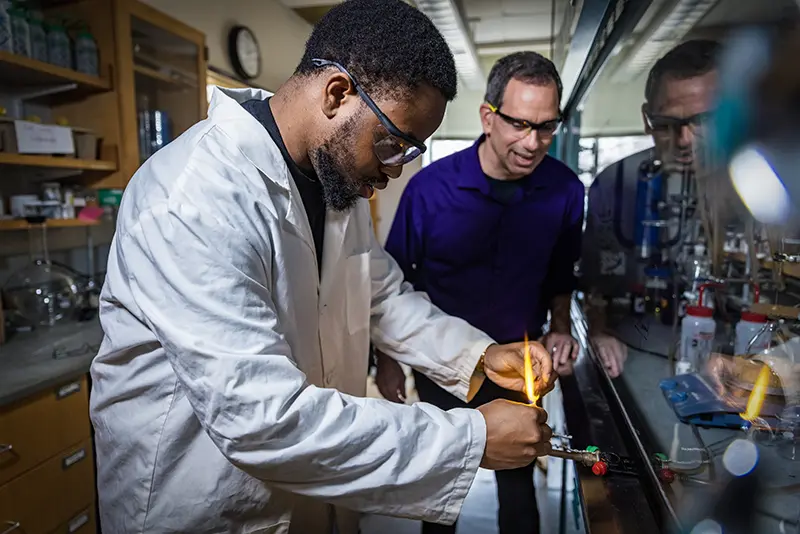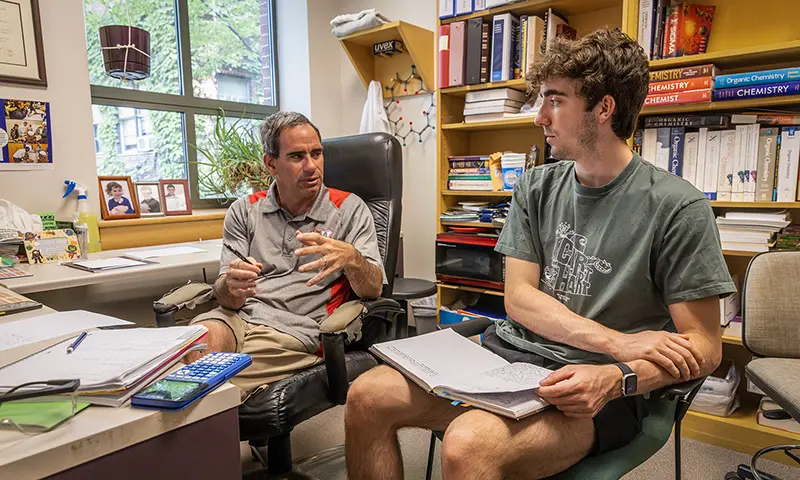The Pulteney Street SurveyWinter '24

Professor of Chemistry Justin Miller looks on as Jadon Layne ‘25 pulls pipettes to make thin layer chromatography spotters.
Lab tested
Benchwork in Professor of Chemistry Justin Miller’s lab armed Brogan Dietsche ’25 and Jadon Layne ’25 with the molecular chemistry research skills to thrive in internships at MIT and Yale.
BY ANDREW WICKENDEN ’09
Not long after Jadon Layne ’25 arrived on campus, Professor of Chemistry Justin Miller recruited him into his research group, where teaching and learning go hand-in-hand with research.
“It’s amazing to have that close relationship with Professor Miller,” says Layne, a pre-med biochemistry major. “He’s very nurturing and that creates an environment where people can grow.”
That growth helped Layne secure a summer research internship at the Yale School of Medicine, where he returned the following winter and again last summer to discover how the virus that causes COVID-19 reproduces and spreads so efficiently.
“The primary goal is to analyze how the virus is using the host’s ubiquitin system to its advantage,” Layne explains. “Along the way, we have been discovering new information about not only the viral mechanisms but the cellular mechanisms.... Given how pathogenic the virus is, the avenue of ubiquitination emerges as a viable target for potential antiviral therapeutics.”
For Layne, it’s important to understand research within the broader scientific context. Engaging with experts and studying literature is vital, as is being able to communicate findings (he presented his work to Yale’s infectious disease and rheumatology departments) — not to mention fostering the growth of other scientists.
Back on campus, Layne has turned his attention to nurturing the HWS scientific community. With Aidan Vanek ’25 and Oliver Tauscher ’25, he cofounded the Health Professions Association, a new club intended to “expose and prepare students for any area of healthcare that they are interested in.”
Miller and Brogan Dietsche ’25 discuss the nuclear magnetic resonance data from their summer research project.
Chemistry major Brogan Dietsche ’25 spent the early weeks of last summer on campus, working alongside Miller to synthesize two drug-related, bio- functional molecules. One masks drug molecules, allowing them to diffuse passively into cells, while the other is a potential anti-cancer compound that may have therapeutic applications.
Dietsche brought his research skills to the Massachusetts Institute of Technology, where he developed molecules for very different applications. Funded by the National Science Foundation Center for the Chemistry of Molecularly Optimized Networks, his research internship focused on designing and synthesizing mechanophore vulcanizing agents to strengthen polymer networks like those in industrial-grade plastics.
Looking back on his chemistry education thus far, Dietsche says his coursework has been “a perfect segue to now doing research as part of Professor Miller’s lab,” and the organic synthesis methodology and techniques he learned working with Miller carried over to the MIT internship. With his sights set on a Ph.D. in chemistry, these experiences on and off campus have provided Dietsche with “a strong foundation for when I’m eventually doing research on my own.”
